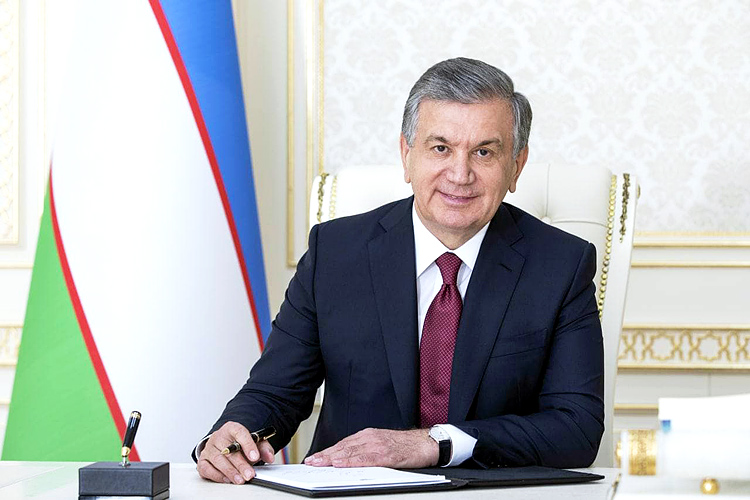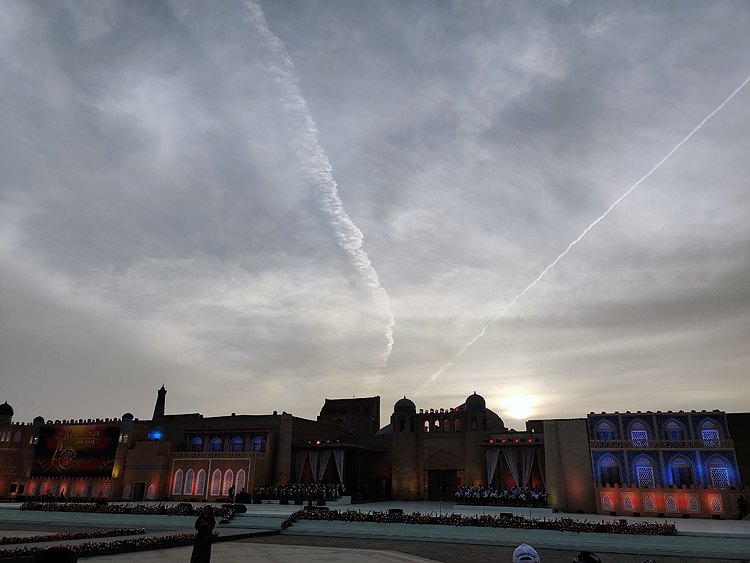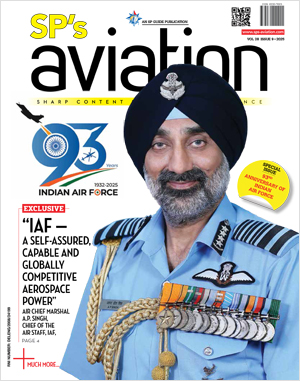INDIAN ARMED FORCES CHIEFS ON OUR RELENTLESS AND FOCUSED PUBLISHING EFFORTS

The insightful articles, inspiring narrations and analytical perspectives presented by the Editorial Team, establish an alluring connect with the reader. My compliments and best wishes to SP Guide Publications.

"Over the past 60 years, the growth of SP Guide Publications has mirrored the rising stature of Indian Navy. Its well-researched and informative magazines on Defence and Aerospace sector have served to shape an educated opinion of our military personnel, policy makers and the public alike. I wish SP's Publication team continued success, fair winds and following seas in all future endeavour!"

Since, its inception in 1964, SP Guide Publications has consistently demonstrated commitment to high-quality journalism in the aerospace and defence sectors, earning a well-deserved reputation as Asia's largest media house in this domain. I wish SP Guide Publications continued success in its pursuit of excellence.
- A leap in Indian aviation: Prime Minister Modi inaugurates Safran's Global MRO Hub in Hyderabad, Calls It a Milestone
- All about HAMMER Smart Precision Guided Weapon in India — “BEL-Safran Collaboration”
- India, Germany deepen defence ties as High Defence Committee charts ambitious plan
- True strategic autonomy will come only when our code is as indigenous as our hardware: Rajnath Singh
- EXCLUSIVE: Manish Kumar Jha speaks with Air Marshal Ashutosh Dixit, Chief of Integrated Defence Staff (CISC) at Headquarters, Integrated Defence Staff (IDS)
- Experts Speak: G20 Summit: A Sign of Global Fracture
Uzbekistan's progressive transformation is a bright spot in Central Asia; boosts cultural ties with India
Both Uzbekistan and India are countries with rich traditions of art, music, and literature, which form the foundation for cultural diplomacy

Uzbekistan is at the forefront of leading the critical reforms which span across governance, economic and technological transformation. What is key facet here is the bold approach of the government, which puts a greater spotlight on Tashkent at the heart of Central Asia. Once a volatile and fragmented nation out of the erstwhile USSR is progressively open to international outreach, collaboration, where India has secured strategic relations, cutting across security to cultural ties.
Two nations with deep historical connections are strengthening their ties through a variety of collaborative efforts. Significantly, some of the strategic collaborations have advanced under the leadership of Uzbekistan's President Shavkat Mirziyoyev, who has been at the helm of such policies aimed at enhancing cultural, economic, and diplomatic ties with neighbouring countries, as well as broader international engagement.
Uzbekistan's President Shavkat Mirziyoyev has been at the helm of policies aimed at enhancing cultural, economic, and diplomatic ties with neighbouring countries, as well as broader international engagement
At the heart of these deepening relations lies a shared cultural heritage and the enduring spirit of cooperation. Both Uzbekistan and India are countries with rich traditions of art, music, and literature, which form the foundation for cultural diplomacy. These ties are not merely the products of shared history but have been carefully cultivated in recent years, reflecting a renewed commitment to mutual understanding and respect.
The Role of President Shavkat Mirziyoyev's Policy
Since taking office in 2016, President Shavkat Mirziyoyev has implemented a series of reforms aimed at modernising Uzbekistan's domestic and foreign policy. Mirziyoyev's approach emphasises openness and regional cooperation, positioning Uzbekistan as a proactive player in Central Asia and beyond. His foreign policy initiatives have called for closer ties with countries like India, with whom Uzbekistan shares historic cultural links, especially through the Silk Road.
What is important to note is the approach Uzbekistan's foreign policy adopts in its autonomy towards its global outreach, bereft of any alliances. That is exactly what Uzbekistan aims to do: develop and transform as an economic powerhouse, as a hub of regional trade as well as tech.
"Our focus is on economic and technological development," said a senior official from the Ministry of Foreign Affairs (MFA) of Uzbekistan in Tashkent.
That is not mere words. Uzbekistan, in recent times, has managed to resolve all the conflicts, especially settling its border issues with volatile neighbours.
Beyond, "we focus on regional integrity, open market access, and regional connectivity," remarks the senior official at the MFA.
What is important to note is the approach Uzbekistan's foreign policy adopts in its autonomy towards its global outreach, bereft of any alliances. That is exactly what Uzbekistan aims to do: develop and transform as an economic powerhouse, as a hub of regional trade as well as tech
"India is at the heart of foreign and trade policy," he added.
"A focus on strategic partnership, economic cooperation, and security collaboration with India is shaping our relations. This includes trade, investment, and connectivity projects, as well as shared security interests and multilateral cooperation, he said.
India and Uzbekistan have long enjoyed cultural exchanges, with both nations sharing influences in their art, architecture, and religious history. in the recent past, under Mirziyoyev's leadership, the relationship has evolved into a more structured partnership, driven by mutual interest in economic development, technology, and cultural preservation.
India's growing interest in Central Asia, paired with Uzbekistan's efforts to boost regional integration, has provided much impetus. As both countries seek to diversify their economies and increase cultural exchanges, these areas of cooperation will continue to expand.

The Cultural Exchange and the International Bakhshi Art Festival
One of the most visible examples of this blossoming cultural partnership is the celebration of traditional arts, such as music, dance, and storytelling, which have long been central to the cultures of both Uzbekistan and India. Among the most prominent cultural initiatives is the International Bakhshi Art Festival, an event that showcases the rich tradition of epic storytelling and performance art in Uzbekistan.
The term "Bakhshi" refers to the traditional bards or performers in Central Asia who are masters of oral storytelling and music, often recounting the epic sagas that form the foundation of the region's cultural identity. These performances, which blend poetry, music, and drama, are integral to the social fabric of many Central Asian societies.
The International Bakhshi Art Festival, held in Uzbekistan, draws attention to this unique aspect of Uzbek culture while also fostering international collaboration.
The International Bakhshi Art Festival, held in Uzbekistan, draws attention to this unique aspect of Uzbek culture while also fostering international collaboration. The festival brings together artists, performers, and audiences from around the world to celebrate not only the Bakhshi tradition but also the broader cultural expressions of Central Asia.
India's participation in this festival further strengthens the cultural ties between the two nations. With a growing interest in Central Asian culture, India has sent delegations of artists, musicians, and cultural ambassadors to showcase the depth of its artistic heritage. India's tradition of epic storytelling, such as through the Mahabharata and Ramayana, resonates with the Bakhshi art form, creating a rich cultural exchange between the two nations.
Bridging Traditions: Cultural Diplomacy for the Future
The significance of the Bakhshi Art Festival extends beyond the celebration of traditional music and storytelling. It highlights the broader role of cultural diplomacy in fostering deeper bilateral ties. Cultural exchanges, like those between Uzbekistan and India, provide an opportunity for people to connect through shared traditions and understand one another's histories in meaningful ways.
In recent years, India has shown increasing interest in the cultures of Central Asia, particularly Uzbekistan, due to its historical and cultural influence. Through such festivals, artists and cultural leaders from both countries can engage in dialogue, share expertise, and collaborate on projects that preserve and promote their rich cultural heritage.
The ongoing partnership between Uzbekistan and India serves as a model for how nations can collaborate in the modern era, balancing economic growth with the celebration of their rich cultural histories.
Furthermore, the Bakhshi Festival offers a platform for future generations to explore and appreciate traditional forms of art, fostering a sense of pride in their cultural identity while promoting a global understanding of the diverse expressions of human creativity. The festival's international scope strengthens ties not only between Uzbekistan and India but also with other nations that participate or take an interest in Central Asian culture.
Looking Ahead: A Future of Collaboration and Unity
As Uzbekistan and India continue to strengthen their cooperation, the role of cultural diplomacy will be crucial. Through progressive policies under the leadership of President Mirziyoyev and initiatives like the International Bakhshi Art Festival, both nations are ensuring that their cultural legacy is preserved and shared with the world. The ongoing partnership between Uzbekistan and India serves as a model for how nations can collaborate in the modern era, balancing economic growth with the celebration of their rich cultural histories.
The cultural ties between Uzbekistan and India are only poised to deepen, and with events like the Bakhshi Art Festival at the forefront, the next chapter in this relationship promises to be one of creative collaboration and mutual respect, fostering stronger connections in both cultural and diplomatic realms.
Manish Kumar Jha is a Consulting & Contributing Editor for SP's Aviation, SP's Land Forces and SP's Naval Forces and a security expert. He writes on national security, military technology, strategic affairs & policies.





